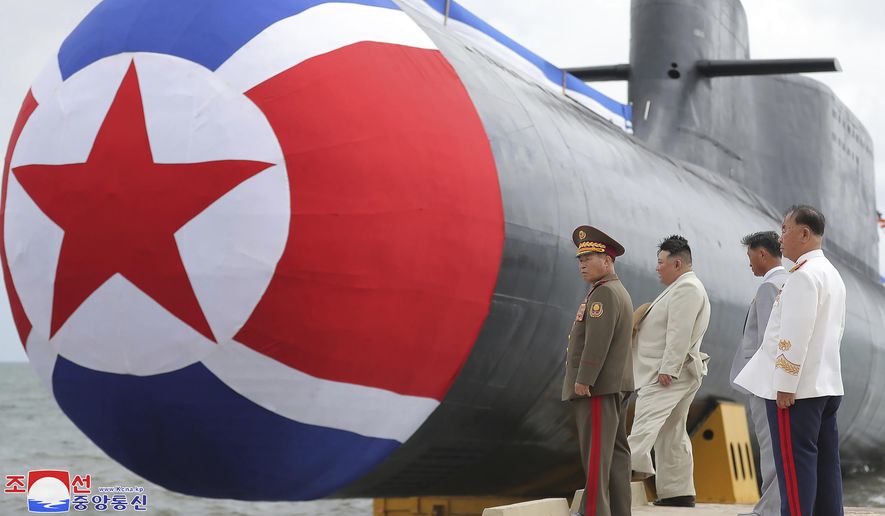A version of this story appeared in the daily Threat Status newsletter from The Washington Times. Click here to receive Threat Status delivered directly to your inbox each weekday.
Russia vetoed a United Nations resolution Thursday keeping alive a program to monitor sanctions against North Korea’s nuclear program in the latest sign of fast-warming ties with Pyongyang that have unnerved the U.S. and its regional allies.
The Kremlin’s envoy to the U.N. told the Security Council before the vote that the monitoring program began with good intentions — to prevent the proliferation of nuclear weapons in the region — but has become not only irrelevant but “divorced from reality.”
The veto comes as Russian President Vladimir Putin and North Korean leader Kim Jong-un have forged an increasingly close bond, with the Biden administration saying Mr. Kim is already supplying a large number of artillery shells to help Russia’s strapped force in the war in Ukraine and Russia is looking to help upgrade North Korea’s military prowess.
Nations across the region and the world have looked on in alarm as Mr. Kim has steadily built up the isolated North’s nuclear arsenal. But Russian Ambassador Vassily Nebenzia accused the West, led by the United States, of now seeking to “suffocate” Pyongyang with harsh unilateral restrictions, aggressive propaganda and direct threats against North Korean officials.
“Taken together, all these measures call into question the possibility of resolving problems on the peninsula in the future,” Mr. Nebenzia said. “Over the past years, sanctions have not contributed to the achievement of the goals set out by the international community and have not led to the normalization of the situation around the peninsula.”
North Korea’s Mr. Kim has ratcheted up tensions on the divided Korean Peninsula with a string of missile and weapons tests and repeated threats to unleash his nuclear weapons since President Biden took office. The U.S. and its allies South Korea and Japan have responded by carrying out combined military exercises and updating their defense and deterrence strategy.
The vote in the 15-member Security Council was 13-1 against Russia, with China abstaining. The resolution would have extended the mandate of the UN’s panel of experts for a year. Russia’s veto will halt its operation when the current mandate expires next month.
At the White House, national security spokesman John Kirby denounced the Russian action as “reckless.” In New York, U.S. Deputy U.N. Ambassador Robert Wood said he was “deeply disappointed” by the veto.
“Today’s vote was nothing more than the attempt by one Council member to silence the independent, objective investigations into [North Korea’s] Security Council violations. There is simply no other honest way to view this,” Mr. Wood said.
The most recent U.N. sanctions on North Korea, passed in December 2017, set up a committee of experts to monitor possible violations.
The North Korean sanctions “need maintenance – not elimination – in order to effectively work,” Mr. Wood argued.
But Mr. Nebenzia said it was obvious that U.N. sanctions on North Korea haven’t contributed to the “normalization of the situation” on the Korean peninsula, with hostile moves by the U.S. and South Korea largely to blame.
“This situation does not encourage the parties to engage in dialogue, especially after Washington demonstrated its dishonest game to the whole world,” he said.
Barbara Woodward, the U.K.’s ambassador to the U.N., said the Russian veto “is about Russia gaining the freedom to evade and breach sanctions in pursuit of weapons to be used against Ukraine.”
The monitoring panel has become “an ‘inconvenience’ for Russia,” she added.
The U.S. continues to closely monitor any Russian-provided support to North Korea in return for weapons such as the ballistic missiles it has fired against Ukraine in its war now in its third year.
North Korea’s “transfer of ballistic missiles to Russia supports Russia’s war of aggression, increases the suffering of the Ukrainian people, and undermines the global non-proliferation regime,” the State Department said earlier this year.
The Security Council first sanctioned North Korea after its nuclear test explosion in 2006. Nine subsequent resolutions since then have unsuccessfully tried to choke off the funding and support for Pyongyang’s nuclear and ballistic missile programs, but this was the first time Russia vetoed the monitoring mandate.
The U.S., Britain, France, Japan and South Korea released a joint statement Thursday criticizing Moscow for undermining what they called “the gold standard for providing fact-based, independent analysis of the UN Security Council resolutions about North Korea.”
“These reports help all member states carry out their Security Council obligations and address [North Korea’s] unlawful pursuit of weapons of mass destruction,” according to their statement. “We must ask ourselves: Why would any Council member break 14 years of unanimous support for this mandate?”
• Mike Glenn can be reached at mglenn@washingtontimes.com.




Please read our comment policy before commenting.